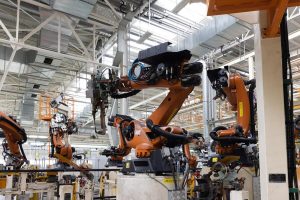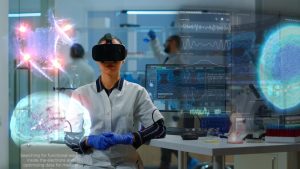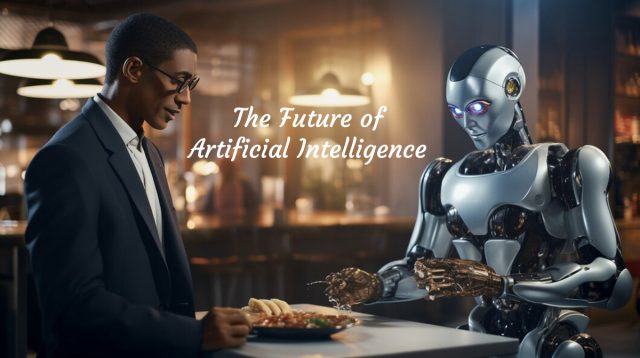Introduction to the Future of Artificial Intelligence
Artificial Intelligence (AI) is reshaping the world we live in, with its transformative capabilities and innovative applications across various sectors. As we delve into the future of AI, we witness a paradigm shift in how technology interacts with humanity, paving the way for unprecedented advancements and opportunities.
Table of Contents
- Introduction to the Future of Artificial Intelligence
- Evolution of Artificial Intelligence Technology
- Applications of Artificial Intelligence in Various Industries
- Progress in Machine Learning and Deep Learning
- Natural Language Processing and AI-Powered Communication
- Robotics and Automation: Transforming Industries
- AI Ethics and Responsible Innovation
- How Artificial Intelligence is Changing Healthcare
- AI in Finance: Enhancing Decision-Making Processes
- How AI is Shaping Customer Experience and Personalization
- AI in Education: Revolutionizing Learning and Teaching
- The Intersection of AI and IoT: Smart Connected Ecosystems
- Challenges and Opportunities in the Adoption of AI
- Future Trends and Predictions in Artificial Intelligence
- Conclusion: Embracing the Potential of Artificial Intelligence
Evolution of Artificial Intelligence Technology
From its inception to the present day, AI has undergone significant evolution, fueled by advancements in algorithms, computing power, and data availability. The journey of AI showcases the relentless pursuit of creating intelligent systems that can mimic human cognition and decision-making processes.

Applications of Artificial Intelligence in Various Industries
AI finds widespread applications in industries such as healthcare, finance, retail, and manufacturing, revolutionizing operations, enhancing efficiency, and driving innovation. The integration of AI technologies enables organizations to leverage data-driven insights, automate tasks, and deliver personalized experiences to customers.
Advancements in Machine Learning and Deep Learning
Machine learning and deep learning algorithms are at the forefront of AI innovation, empowering systems to learn from data, recognize patterns, and make intelligent decisions. The continuous evolution of these technologies fuels breakthroughs in areas like image recognition, natural language processing, and predictive analytics.
Natural Language Processing and AI-Powered Communication

Natural Language Processing (NLP) enables machines to understand, interpret, and generate human language, facilitating seamless communication and interaction. AI-powered chatbots, virtual assistants, and language translation tools exemplify the transformative impact of NLP on enhancing user experiences.
Robotics and Automation: Transforming Industries

Robotics and automation technologies powered by AI are revolutionizing industries by enhancing productivity, precision, and safety in manufacturing, logistics, and healthcare. Collaborative robots, autonomous vehicles, and robotic process automation redefine traditional workflows and drive operational efficiency.
AI Ethics and Responsible Innovation
As AI technologies become more pervasive, ethical considerations and responsible innovation practices are paramount in ensuring the development of AI systems that align with societal values and principles. Addressing issues of bias, privacy, transparency, and accountability is essential in fostering trust and acceptance of AI solutions.
The Role of Artificial Intelligence in Healthcare

AI holds immense potential in revolutionizing healthcare delivery, from medical imaging and diagnostics to personalized treatment plans and drug discovery. AI-powered healthcare solutions offer predictive analytics, remote monitoring, and precision medicine, improving patient outcomes and healthcare efficiency.
AI in Finance: Enhancing Decision-Making Processes
In the finance industry, AI algorithms drive data analysis, risk assessment, fraud detection, and algorithmic trading, optimizing decision-making processes and enhancing operational efficiency. AI-powered financial services enable predictive modeling, automated transactions, and personalized recommendations for customers.
How AI is Shaping Customer Experience and Personalization

AI enables businesses to deliver tailored experiences to customers by analyzing data, predicting preferences, and personalizing interactions. Customer relationship management systems, recommendation engines, and targeted marketing campaigns leverage AI to enhance engagement and satisfaction, driving loyalty and retention.
AI in Education: Revolutionizing Learning and Teaching
In the education sector, AI technologies transform learning experiences through adaptive learning platforms, virtual tutoring, and personalized learning paths.
QnA
- How is Artificial Intelligence shaping the future of technology?
Artificial Intelligence is revolutionizing technology by enabling machines to perform tasks that typically require human intelligence, such as learning, reasoning, and problem-solving. AI is driving innovations across industries and transforming the way we interact with technology.
- What are some everyday applications of Artificial Intelligence that we might not be aware of?
AI is integrated into various aspects of our daily lives, from personalized recommendations on streaming platforms to virtual assistants like Siri and Alexa. AI algorithms also power predictive text on smartphones and optimize search engine results, enhancing user experiences.
- Are there any ethical concerns surrounding the use of Artificial Intelligence?
Ethical considerations in AI include issues related to bias in algorithms, data privacy, transparency in decision-making processes, and the impact of AI on employment. It is essential to address these concerns to ensure the responsible development and deployment of AI technologies.
- How can Artificial Intelligence improve healthcare outcomes for patients?
AI in healthcare offers benefits such as early disease detection, personalized treatment plans, and predictive analytics for patient care. By leveraging AI-powered medical imaging, diagnostics, and telemedicine, healthcare providers can enhance diagnosis accuracy, optimize treatment strategies, and improve patient outcomes.
- What role does Artificial Intelligence play in addressing environmental challenges and sustainability?
AI technologies contribute to sustainability efforts by optimizing energy consumption, predicting natural disasters, monitoring climate change, and managing resources efficiently. AI-powered solutions support environmental conservation, renewable energy initiatives, and data-driven decision-making for sustainable development.

















